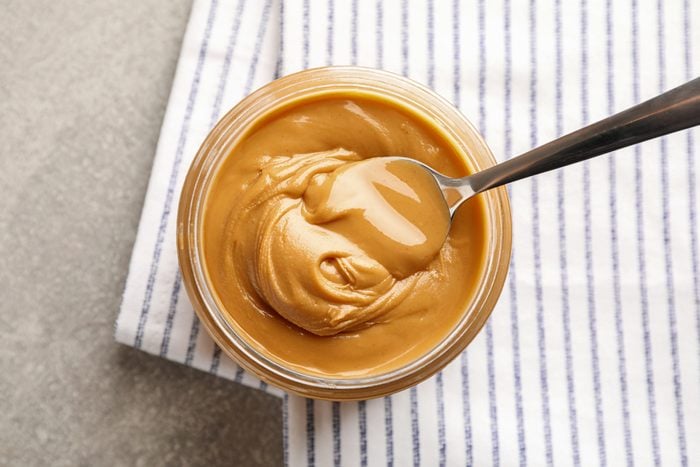Is Peanut Butter Good for People with Diabetes?
Updated: Oct. 10, 2023

Yes, peanut butter can fit into your diabetes meal plan—and it may even help control your blood sugar! Here's what to keep in mind before scooping up that PB.
Rich and creamy with the right amount of salty sweetness, peanut butter is a staple for a reason. It adds a punch of protein to quick snacks and keeps you full until dinnertime.
It’s also a high-calorie food, so it can be confusing for people with diabetes. Here are a few tips to keep in mind before scooping up a spoonful of healthy peanut butter.
Is peanut butter safe for diabetics?
Yes, in moderation. Natural peanut butter is considered safe for people with diabetes. It’s best to avoid the “low-fat” varieties of peanut butter. They sound healthy—but most brands simply add more sugar to make up for less fat. This can spike blood sugar levels and leads to more daily carbohydrates.
Studies have shown that when people with type 2 diabetes follow a low-carb diet, they can reap health benefits from adding peanuts to their diets. By replacing certain foods with peanuts or natural peanut butter, it’s possible to lose weight, improve blood sugar control and regulate the amount of fat in the blood (also known as blood lipid level).
Peanut butter also helps control blood sugar in those who don’t have diabetes. In fact, eating peanut butter may even lower the risk of developing type 2 diabetes. Peanut butter is rich in unsaturated fats that help the body regulate insulin and blood sugar levels. Peanuts are also rich in magnesium. Research shows that diets rich in magnesium can be protective against diabetes.
Not a fan of peanut butter? You can reap many of the same benefits with almond butter.
Peanut Butter Nutrition Facts
Peanut butter can get a bad rap for being high in calories. A two-tablespoon serving of peanut butter contains about 188 calories, 7.7 grams of protein, 6.9 grams of carbohydrates and 2.4 grams of saturated fat. When enjoyed in moderation, peanut butter can be a healthy part of your diabetes-friendly meal plan.
Will peanut butter raise blood sugar?
No, natural peanut butter will not raise blood sugar. In fact, it could stabilize your numbers.
A 2018 study found that eating two tablespoons of peanut butter with white bread and apple juice led to a significantly lower blood glucose spike when compared with white bread and juice alone. The protein and healthy fats in peanut butter help our bodies avoid a blood sugar spike (and eventual crash).
Adding peanut butter to your breakfast routine may aid in blood sugar control throughout the day. A 2012 study found that when women with obesity ate peanuts or peanut butter in the morning, they were more likely to be able to manage their blood sugar levels throughout the day.
Best Peanut Butter for Diabetics
Peanut butter is a high-calorie food, so it’s important to enjoy in moderation. Try replacing some refined carbs or processed meats with peanut butter. This will help avoid adding too many calories to your healthy eating plan.
When choosing peanut butter at the store, opt for a natural variety with as few ingredients as possible. Avoid any brands that add sugar or other sweeteners. Ditch any low-fat varieties because they are typically loaded with sugar. Some brands use partially hydrogenated oils in their peanut butter. These oils have been linked to heart disease, so skip those as well.
To choose the best peanut butter for you and your health, start by reading the ingredient list. Crazy Richard’s 100% Peanuts Peanut Butter has one ingredient: peanuts! Learn more about peanut butter nutrition and how to shop for a healthy option.
How to eat peanut butter if you have diabetes
You can eat peanut butter with all kinds of healthy diabetes snacks, like spreading peanut butter on whole wheat toast or using peanut butter as a complimentary dip for green apple slices. For breakfast, add a spoonful into a smoothie bowl or yogurt parfait for a fulfilling meal that’ll keep you full until lunchtime.
